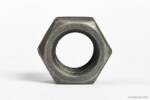Newest FAQs
Hex vs. Heavy Hex Jam Nuts
What is the difference between hex and heavy hex jam nuts?A jam nut is a thin nut primarily used as a locking device, run up against a full-height nut that has been tightened into place to prevent that primary nut from loosening. Jam nuts are not used as structural parts and are commonly not manufactured to meet any specific nut specification since their primary function... Read more

Large Diameter A563-A Hex Nuts
Are A563 Grade A standard hex nuts available larger than 1½” diameter?No. According to the specification, A563 Grade A hex nuts, sometimes referred to as finished hex nuts, stop at 1-1/2” diameter. A563 Grade A nuts are only available larger than 1-1/2” diameter in a heavy hex pattern. Portland Bolt stocks both import and domestic A563 Grade A standard hex and heavy hex nuts.
Large Diameter ASTM F1554
Can F1554 Grade 105 Anchor Bolts Be Made Above 3” Diameter?ASTM specifies the diameter range for F1554 grade 105 anchor bolts as ½” through 3”. What are the options for anchor bolts larger than 3” diameter of similar strength? Because the diameter range is clearly defined as ½” through 3” in the F1554 specification, an anchor bolt larger than 3” diameter can’t be certified to... Read more

Pricing Validity
How long will Portland Bolt hold pricing?To answer simply, as long as we possibly can. At the time of quoting, our pricing reflects the current costs for material and labor. With increases in cost, such as steel, always being a possibility, we can only guarantee pricing at the time of quoting. Our quotes include the following statement: “All quotations are for... Read more
Certified Mill Test Reports
What is a “CMTR”?The acronym CMTR stands for, “Certified Mill Test Report” or “Certified Material Test Reports.” As a manufacturer, it is imperative that we are using the correct raw material when manufacturing a given part, whether it is a bolt or fabricated steel plate. A CMTR is provided by the raw material producer (mill), which is a... Read more
ASTM A47 vs. A48 vs. A536
What is the difference between ASTM A47, A48, and A536?ASTM A47, A48, and A536 are all casting specifications. Each grade has its own strength requirements and base material used. Each grade is also commonly associated with a particular finished part that Portland Bolt stocks. ASTM A47 ASTM A47 covers ferritic malleable castings intended for general use at temperatures from normal ambient to approximately 750°... Read more
Custom Packaging
Does Portland Bolt provide custom packaging?Yes Portland Bolt offers custom packaging. Many of our light rail customers have us fully assemble the OCS foundation bolts marked with the foundation type. This allows them to simply drop the fully assembled bolts into their location. This also frees up their people from the task of field assembling product they may not be... Read more
A490 vs F3125 Grade A490
What changes have occurred to the ASTM A490 specification since it was incorporated into the F3125 specification?In December 2015, ASTM committee F16 approved the new F3125 standard, which combined six structural bolt standards, A325, A325M, A490, A490M, F1852, and F2280. The goal was to clean up inconsistencies within those various standards and combine them, so that future updates would be easier and less costly. The goal was not to drastically change... Read more
A325 vs F3125 Grade A325
What changes have occurred to the ASTM A325 specification since it was incorporated into the F3125 specification?In December 2015, ASTM committee F16 approved the new F3125 standard, which combined six structural bolt standards, A325, A325M, A490, A490M, F1852, and F2280. The goal was to clean up inconsistencies within those various standards and combine them, so that future updates would be easier and less costly. The goal was not to drastically change... Read more
Stainless Yield & Tensile Strength
What are the strength and yield values for stainless steel bolts?Typically when bolts are ordered, they are called out by a specific ASTM or SAE grade. Stainless steel bolts are a bit different though, as they are commercially available and regularly ordered simply by the material itself, most commonly 316 or 304 stainless steel. Unlike bolts that fall under ASTM specifications, there are no specific... Read more
